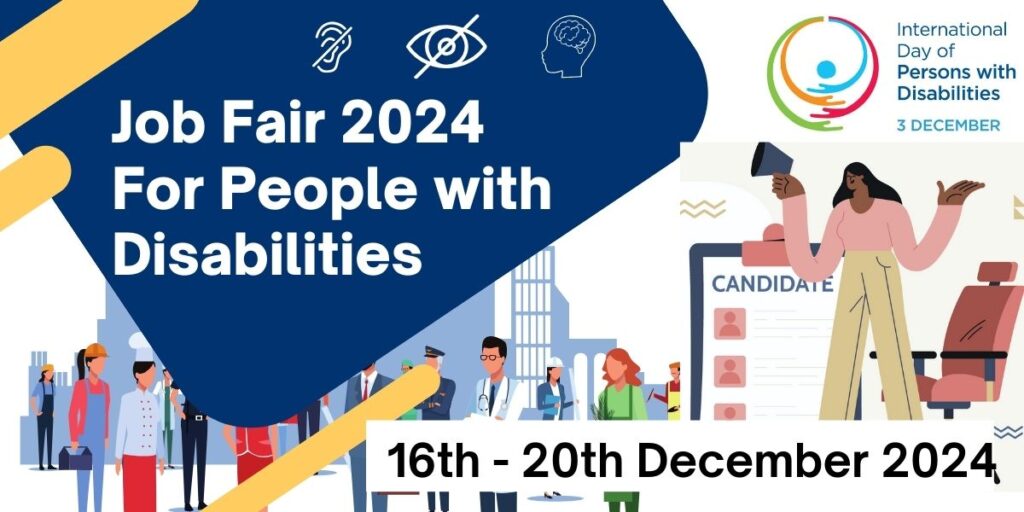
GiftAbled is hosting an offline recruitment event to connect youth with disabilities to the corporate workforce, promoting diversity and inclusion in the workplace. This initiative aims to raise awareness and provide job opportunities for people with disabilities.

Objectives
Offer hiring opportunities to employers to meet their workforce needs.
Enable youth with disabilities to access suitable employment.
Increase awareness of workplace diversity and inclusion.
Facilitate face-to-face interactions between candidates and companies through interviews.
Steps to Participate
Registration
Sign up via the link on the website or email.
Payment
Complete the registration fee payment within five days and submit the job description (JD).
Share JD and Interview Details
Provide the JD and interview process details within two days of registration.
Promote the Event
Send the company profile, culture information, and logo for social media promotion.
Interview Arrangement
Companies should commit to conducting the first-round interviews face-to-face, either at GiftAbled's office or the company premises.
Candidate Shortlisting
Select candidates for interviews on the day of the event.
Availability of Selection Team
Ensure all personnel involved in the hiring process are present on the day.
Contact Details
Avoid sharing contact details directly with candidates
Same-Day Decisions
Interview and finalize shortlisted candidates during the Job Fair.
Tips to prepare for the Job Fair
- Virtual job fairs are much different from the in-person experience, so preparation is vital to success and to build a lasting impression on a recruiter or employer. Those who can adapt will have a great advantage. Here are some key ways to put your best foot forward and maximize your time with a recruiter.
- Do your research. One of the most common pieces of advice from recruiters and career services utilizing virtual career fairs is to do your research. Cruzvergara urges candidates to cross-reference their research with company reviews on platforms like Handshake to inform smart questions for recruiters. “Think of questions that would allow you to get deeper knowledge about the culture of the organization, what it means to be able to move up in that organization, or what it is you would be able to contribute or learn in that organization.”
Sharpen your communication skills. According to Jenny Petru, corporate recruiting manager at Regency Integrated Health Services, who has worked with CareerBuilder on virtual recruiting, “The best way a candidate can stand out is good communication skills and good grammar skills. … In a virtual world, you don’t want to write like you’re texting a friend; you still want to have that professionalism.”
Don’t give up. To make the most of this opportunity, Trappey encourages candidates to put themselves out there and overcome any apprehensions they may have about virtual recruiting. “The key to finding a job or an internship is to keep trying. Just say yes to a virtual event or go to LinkedIn to make those connections yourself. Having the confidence to do that even if you feel awkward is integral to landing a job no matter where you are.”
Best Practices for Recruiting Candidates with Disabilities
Creating an inclusive and accessible hiring process can help tap into a diverse talent pool. Here are some key practices:
- Form an inclusive interview panel.
- Screen candidates in a way that includes rather than excludes.
- Be prepared to answer questions about disability and accessibility.
- Learn about the candidate’s disability and any potential impacts.
Guidelines for Interviewing Candidates with Disabilities
Visually Impaired Candidates:
- Treat the candidate as you would anyone else; presume they can do the job unless proven otherwise.
- Foster an environment that encourages disclosure, and emphasize your company’s commitment to inclusivity.
- Use people-first language (e.g., “person with a visual impairment” rather than “blind person”).
- Always identify yourself and introduce anyone present.
Hearing Impaired Candidates:
- Use on-site interpreters for interviews and meetings. Alternatively, consider communication tools like apps, video phones, and text messaging.
- Evaluate candidates based on their ability to perform essential job functions. Avoid assumptions about their abilities.
- Find suitable accommodations by asking candidates what works best for them. Available tools include:
- Video Phone Technology: Enables communication via videophones or video conferencing (e.g., Skype).
- Other Tools: Consider dry erase boards, notepads, text messaging, and other simple communication methods. Learning basic sign language can also be helpful.